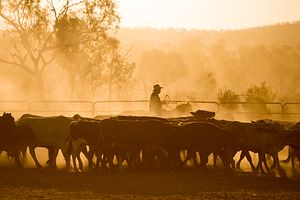Once again a Chinese-run conglomerate has been refused permission to acquire the Kidman cattle stations on national security grounds.
We reported on this last year when in the same week the government refused both the sale of the nine stations to China’s Pengxin Group and the sale of the TransGrid electrical supplier in New South Wales, also to a Chinese company, but agreed to the 99-year lease of the Darwin port to company Landbridge. The decisions divided security experts and politicians.
The Kidman cattle empire is the largest private land holding in Australia. In December, it was not just the size which mattered but proximity to the Woomera Prohibited Area, which tests munitions. That part, the Anna Creek station, was later carved out, to obviate worries.
Early last month Dakang Australia Holdings lodged a A$370 million ($272.5 million) bid. Even then it did not attract widespread approval. Senator Nick Xenophon, an independent from South Australia, told media that the sale “isn’t just selling the farm, it’s selling Australia’s largest farm.”
At the end of April, Treasurer Scott Morrison, who was expected to allow the deal to go ahead, shot it down. It seems the would-be buyers got close, but Morrison vetoed it on national security grounds: It is just too big a chunk of land to sell to one foreign group.
It may also be just too big for a domestic buyer: Apparently well over 100 local parties could have, but did not, bid on it. Carve it up again and the risks is that its value becomes less than the sum of its parts and there will be cuts to jobs. Carving up the property may also carve up beef production, a problem when Australia is betting on its agricultural exports at this time of economic “transition.”
Such a large parcel of land to sell to any non-Australian investor always worries the populace slightly, but Chinese investment makes people especially nervous. Chinese investments in farmland worth more than A$15 million must be approved by Treasury, down from A$252 million and far below the billion-dollar threshold for other nations like New Zealand or the United States.
Australia is hardly averse to selling to China more generally; The Diplomat has reported at length on Australia’s enthusiasm for Chinese markets and Malcolm Turnbull’s recent trade-focused trip. Yet Australia still prefers to export what comes out of its land, be it animal, vegetable or mineral, than the land itself.

































